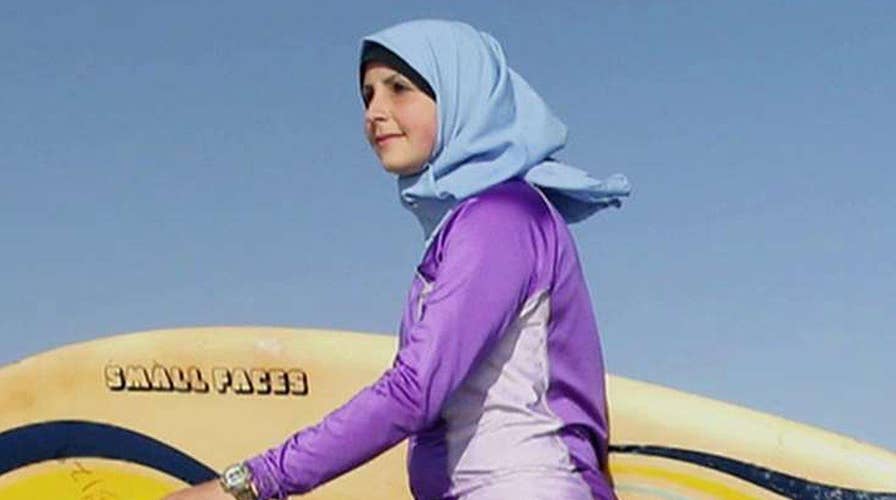French mayors have promised to ignore a court decision declaring the country’s beach burkini bans illegal.
The ban was overturned by the State Council Friday, just days after Muslim women were forced to remove the garment on public beaches.
Nice town hall said it would “continue to fine” women wearing the burkini and the far-right mayor of Frejus, David Rachline, insisted his ban was “still valid.”
Ange-Pierre Vivoni, Socialist mayor of the Corsican town of Sisco, said his burkini ban would remain “for the safety of property and people in the town because I risked having deaths on my hands.”
Ruling Socialists are also divided, with Education Minister Najat Vallaud-Belkacem and Health Minister Marisol Touraine concerned over the “drift” in the local orders, while Prime Minister Manuel Valls backed the mayors.
He stuck to his guns yesterday evening, saying the State Council’s ruling “does not end the debate which has been opened.”
“It is a fundamental debate, which follows on from others,” he said, recalling that France was the first country in Europe to ban the full veil in public spaces in 2010.
The headscarf was banned from schools in 2004.
The ruling specifically concerns a ban in the Riviera town of Villeneuve-Loubet, but the binding decision is expected to set a legal precedent for all the 30 or so municipalities that have issued similar decrees.
The three judges stated the law “seriously, and clearly illegally, breached the fundamental freedoms to come and go (and) the freedom of beliefs and individual freedom.”
Lawyers for two human rights groups challenged the legality of the ban, saying the orders infringe basic freedoms and that mayors have overstepped their powers by telling women what to wear on beaches.
Mayors had cited concern about public order after deadly ISIS attacks this summer, and many officials have argued that burkinis oppress women.
Lawyer Patrice Spinosi, representing the Human Rights League, told reporters that the decision should set a precedent, and that other mayors should conform to it.
"It is a decision that is meant to set legal precedent. Today all the ordinances taken should conform to the decision of the Council of State.
"Logically the mayors should withdraw these ordinances. If not legal actions could be taken.
"Today the state of law is that these ordinances are not justified. They violate fundamental liberties and they should be withdrawn."
He also said women who have already received fines can protest them based on today's decision.
Amnesty International meanwhile welcomed the ban, with spokesman John Dalhuisen saying: "By overturning a discriminatory ban that is fuelled by and is fuelling prejudice and intolerance, today's decision has drawn an important line in the sand."
The bans have since sparked fierce debate about France’s secular values, women’s rights and religious freedom.
Nicolas Sarkozy, the former French president, on Thursday called for a full ban, as he warned that immigrants, minorities and the Left were threatening to destroy French identity.
In the first big speech of his campaign to win back the office he lost in 2012, Mr Sarkozy stole many ideas of the far-Right Front National, promising to reclaim France "for the French."
"I refuse to let the burkini impose itself at French beaches and swimming pools," he said, linking the garment to the July attack in Nice in which an ISIS-linked lorry driver killed 85 people.
But the groups who brought today’s appeal pointed to the fact that 30 Muslims were among the dead in Nice, and that the attack had absolutely nothing to do with swimwear whatsoever.
Instead they said the ban was being used by racists to spread collective guilt among five million plus French Muslims, many of whom have strong links to former French colonies.
As the authorities in resorts such as Nice and Cannes have proved, they argued, the ban was being used to discriminate against Muslim women, no matter what they were wearing.
In 2010, France became the first European country to ban the Islamic veil in public places, six years after outlawing the headscarf and other conspicuous religious symbols in state schools.
Security analysts have warned that the dispute will fuel jihadist propaganda for groups like ISIS, as they attempt to portray France and other Western countries as being at war with Muslims.
Manuel Valls, the French Prime Minister, said he was not in favour of nationwide legislation but appeared to support the law in principle by claiming the burkini was "based on the enslavement of women."

